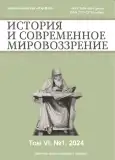Free Time and Recreation of Citizens in the Visual Images of the Soviet Press of the 1920s
- Authors: Klinova M.A.1, Trofimov A.V.2,3
-
Affiliations:
- Institute of History and Archeology of the Ural Branch of the Russian Academy of Sciences
- Ural State University of Economics
- Syktyvkar State University named after Pitirim Sorokina
- Issue: Vol 6, No 1 (2024)
- Pages: 89-94
- Section: SOCIOCULTURAL COMMUNICATIONS IN THE PAST AND PRESENT
- URL: https://journal-vniispk.ru/2658-4654/article/view/258327
- DOI: https://doi.org/10.33693/2658-4654-2024-6-1-89-94
- EDN: https://elibrary.ru/KAJXYH
- ID: 258327
Cite item
Abstract
The purpose of the study. This article analyzes the visual content of the Soviet press of the 1920s, in order to reconstruct the normative and deviant models of recreation reflected in it by the urban population of the country.
Conclusions. In visual media stories, the problems of free time and recreation exist in several planes: imperative (approved, ideologically correct strategies and practices of organizing free time are broadcast); normative (examples are given indicating the «sprouts» of a new way of life); critical (deviant practices and «remnants» of the past that need to be eliminated are ridiculed and castigated). In quantitative terms, in the press of the 1920s, the plots of the first and second groups, devoted to cultural recreation of citizens in parks, libraries, theaters, etc., prevailed. The practices of deviant recreation (drunkenness, gambling, etc.), explained by pre-Soviet remnants, the difficulties of the recovery period, and the lack of education of citizens, were more often represented by anonymous plots indicating vice, but not discrediting specific citizens. The press was intended to form cultural leisure practices among citizens rather than reflect the realities of the pastime of citizens in the 1920s.
Keywords
Full Text
##article.viewOnOriginalSite##About the authors
Marina A. Klinova
Institute of History and Archeology of the Ural Branch of the Russian Academy of Sciences
Author for correspondence.
Email: klinowa.m@yandex.ru
ORCID iD: 0000-0003-0725-4161
Scopus Author ID: 521324
Dr. Sci. (Hist.), Associate Professor, Senior Researcher
Russian Federation, YekaterinburgAndrey V. Trofimov
Ural State University of Economics; Syktyvkar State University named after Pitirim Sorokina
Email: 2519612@rambler.ru
ORCID iD: 0000-0002-3419-6051
Scopus Author ID: 148819
Dr. Sci. (Hist.), Professor, Professor of the Department of Creative Management and Humanities, Professor of the Department of Russian History and General History
Russian Federation, Yekaterinburg; SyktyvkarReferences
- Gataullina I. A. Nepovskaya everyday life of the Volga region: a socio-psychological analysis of «mass marginality» in the context of a modernization perspective // NEP: economic, political and socio-cultural aspects Moscow: ROSSPAN, 2006. Pp. 481–501.
- Golbin A. «Cultural Revolution»: the formation of parks of culture and recreation in the USSR 1928 — 1941. // Bulletin of the Russian State University. Series: History. Philology. Cultural studies. Oriental studies. 2018. No. 5 (38). Pp. 27–36.
- Zhdankova E. Cinema for a «new man»: leisure and cinema in the USSR in the 1920s // New Literary Review. 2022. No. 3 (175). Pp. 122–136.
- Zhuravlev S. V., Mukhin M. Yu. «Fortress of socialism»: Everyday life and motivation of work at a Soviet enterprise, 1928-1938. Moscow: ROSSPEN, 2004. 238 p.
- Klinova M.A., Trofimov A.V. Visual presentation of recreation in the Soviet press of the second half of the 1940s — 1950s // History and modern worldview. 2023. Vol. 5. No. 1. Pp. 75–80.
- Kuher K. Gorky Park. Leisure culture in the Stalin era. 1928-1941. M., 2012. 350 p.
- Lebina N. B. Daily life of the Soviet city: Norms and anomalies. 1920–1930 years. St. Petersburg: Neva Magazine, etc. «Summer Garden», 1999. 316 p.
- Livshin A. Ya. Moods and political emotions in Soviet Russia 1917–1932. Moscow: ROSSPEN, 2010. 344 p.
- Malysheva S. Y. Soviet festive culture in the province: space, symbols, historical myths (1917–1927). Kazan, Ruten, 2005. 400 p.
- Orlov I. B. Family life of Moscow workers in the 1920s: housing conditions, food, leisure // Moscow and the Moscow region: holidays and weekdays. All-Russian Scientific Conference: Collection of articles. Moscow: Publishing House of Moscow State University, 2005. Pp. 45–54.
- Orlov I. B., Pakhomov S. A. «Costumed capitalists» at the NEP «holiday of life». Moscow: Sobranie, 2007. 159 p.
- Plaggenborg Sht. Revolution and Culture: Cultural Landmarks in the Period between the October Revolution and the Era of Stalinism. St. Petersburg: Neva, 2000. 414 p.
- Rozhkov A. Yu. In the circle of peers: The life world of a young man in Soviet Russia of the 1920s. Moscow: UFO, 2014. 640 p.
- Sekenova O.I. Historians on vacation: the daily life of the TSEKUBU sanatoriums and the Academy of Sciences in the 1920s–1960s. // Tula Scientific Bulletin. A series of Stories. Linguistics. 2020. No. 3 (3). Pp. 39–50.
- Ulyanova S., Sidorchuk I. The pernicious passions of the population of Petrograd–Leningrad in the 1920s. The charm of vice. Moscow: Tsentrpoligraf, 2020. 496 p.
- Sherstneva E.V. Sanitary education and propaganda in the fight against drunkenness and alcoholism in the USSR in the 1920s // Problems of social hygiene, healthcare and the history of medicine. 2014. Vol. 22. No. 4. Pp. 54–58.
Supplementary files








